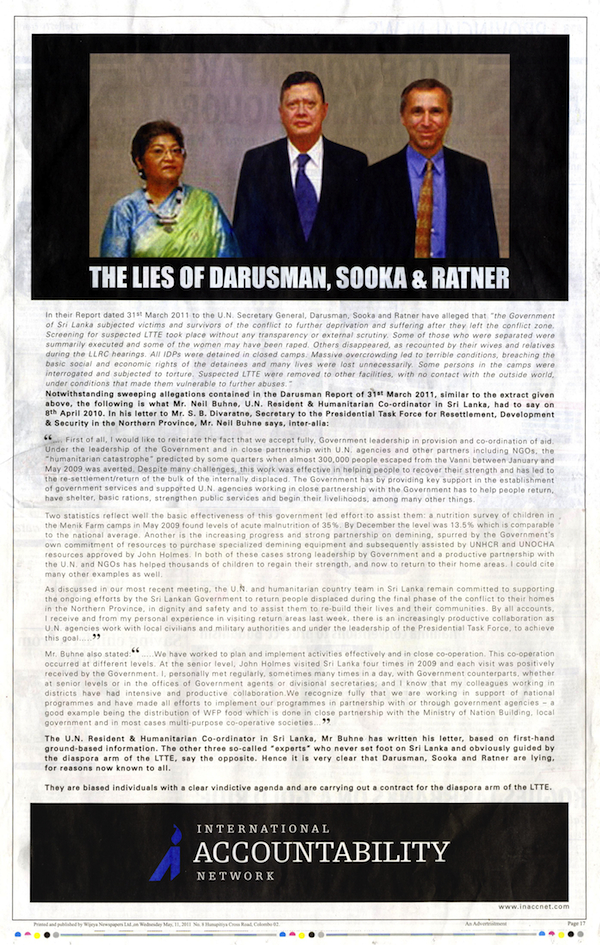In my previous post focussed on how in lectures delivered at the Sri Lanka College of Journalism (SLCJ) on new media, what I end up teaching and discussing with the class is a digital / new media literacy. Sri Lankan journalists have no clue on about investigative journalism online, especially when it involves looking up facts of a technical nature in order to capture more fully a story, process, event or person.
Arguably, this is difficult. Leading newspapers in Sri Lanka like the Sunday Times get it very wrong. The Daily Mirror in particular, and the Wijeya Group’s media network in general – even with massive financial resources – still don’t get web journalism. There are many examples, but a recent one involving Sri Lanka’s Foreign Minister suggests that the fundamental nature of RSS still remains a mystery to those publishing content on the Daily Mirror’s Twitter account. I have taught a number of mid-career journalists from State media over two years at SLCJ, and while they have been on occasion some of the brightest in the class, it is unclear to what degree they can exercise their discretion and imagination to use new media within institutions burdened with a newsroom culture that actively blocks innovation and advancement. What I’ve found is that this is much the same, if not worse, in private media and will take a generation to change.
To be fair, Twitter, Facebook et al offer many challenges for journalists unschooled in web journalism. However, terrific resources set up by such platforms geared at the media (Twitter Media and Facebook and Journalists) are virtually unknown amongst journalists in Sri Lanka. Add to this what is an increasingly sophisticated propaganda campaign by the LTTE rump in the diaspora, self styled pro-government patriots as well as the government itself, and you have an information space with competing ‘facts’ and ‘campaigns’ that’s very hard to navigate, report on and critically analyse.
Case in point was Opposition to the UN Panel report: Any method to this madness? published on Groundviews exposing one Chirasthi Perera, responsible for setting up the godawful looking, largely dysfunctional and incredibly badly executed http://www.inaccnet.com domain (which resolves to http://www.inaccnet.org).A colossal sum of money would have been spent to place full page ads in leading English newspapers, under the ‘International Accountability Network’, that pointed to this site. No one of course had ever heard ‘International Accountability Network’ before.
My interest in figuring out just what this ‘network’ encouraged some investigation online, which led me to an individual presently working with the Sri Lankan Army as a consultant, who lists in his CV the head of the Sri Lankan Army IT Division as his only referee, as responsible for setting up the site and possibly spearheading the newspaper campaign to boot. Revealingly, the Groundviews story led to Chirasthi taking off his CV from the web, but not before we had archived it.
While poorly expressed, Sohan Fernando’s concerns over this full page advertisement are useful to consider. More importantly, there is no reason why it should be only Groundviews that keeps doing this kind of story. With the increasing sophistication of online propaganda, including campaigns on Facebook, Twitter, YouTube and Flickr (inter-linked and with multiple campaign on each platform), journalists need to, inter alia,
- Know how to cut through retweets and get to the originator of a message,
- Ascertain the legitimacy of a Facebook profile,
- Do basic digital photo forensics using online tools to determine what, if anything, has been altered, where a photo has been used previously and sourced from
- Determine the registrant of a website across multiple domain registrars, if this information is in the public domain
- Use advanced search features of Google to hone in on key phrases, sites, file type, date ranges and sources
- Learn to use online visualisation tools to tell a story otherwise too complex or technical to articulate in words (e.g. money laundering networks, or connections between various diaspora groups)
